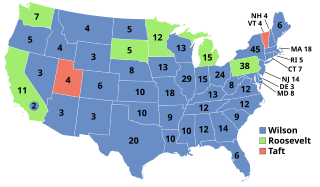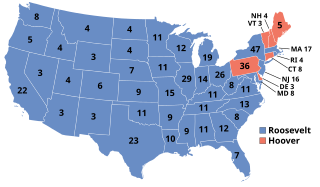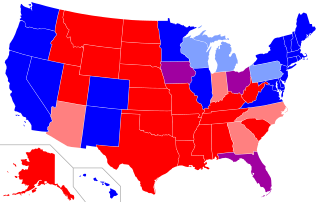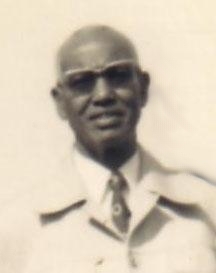
The 2000 United States presidential election was the 54th quadrennial presidential election. It was held on Tuesday, November 7, 2000. Republican candidate George W. Bush, the Governor of Texas and the eldest son of the 41st President George H. W. Bush, won the election by defeating Democratic nominee Al Gore, the incumbent vice president. It was the fourth of five presidential elections in which the winning candidate lost the popular vote, and is considered one of the closest elections in US history.

The United States presidential election of 1876 was the 23rd quadrennial presidential election, held on Tuesday, November 7, 1876. It was one of the most contentious and controversial presidential elections in American history, and is known for being the catalyst for the end of Reconstruction. Republican nominee Rutherford B. Hayes faced Democrat Samuel Tilden. After a controversial post-election process, Hayes was declared the winner.

The United States presidential election of 1912 was the 32nd quadrennial presidential election, held on Tuesday, November 5, 1912. Democratic Governor Woodrow Wilson of New Jersey unseated incumbent Republican President William Howard Taft and defeated former President Theodore Roosevelt, who ran as the Progressive Party nominee. Roosevelt remains the only third party presidential candidate in U.S. history to finish better than third in the popular or electoral vote.

The United States presidential election of 1932 was the thirty-seventh quadrennial presidential election, held on Tuesday, November 8, 1932. The election took place against the backdrop of the Great Depression. Incumbent Republican President Herbert Hoover was defeated in a landslide by Democrat Franklin D. Roosevelt, the Governor of New York. The election marked the effective end of the Fourth Party System, which had been dominated by Republicans.

The United States presidential election of 1936 was the thirty-eighth quadrennial presidential election, held on Tuesday, November 3, 1936. In the midst of the Great Depression, incumbent Democratic President Franklin D. Roosevelt defeated Republican Governor Alf Landon of Kansas. Roosevelt won the highest share of the popular and electoral vote since the largely uncontested 1820 election. The sweeping victory consolidated the New Deal Coalition in control of the Fifth Party System.

The 1972 United States presidential election was the 47th quadrennial presidential election. It was held on Tuesday, November 7, 1972. Incumbent Republican President Richard Nixon defeated Democratic Senator George McGovern of South Dakota.

The 1984 United States presidential election was the 50th quadrennial presidential election. It was held on Tuesday, November 6, 1984. Incumbent Republican President Ronald Reagan defeated former Vice President Walter Mondale, the Democratic candidate.

Elections to the United States House of Representatives for the 109th Congress were held on November 2, 2004. The House of Representatives has 435 seats. It coincided with the reelection of President George W. Bush. In the 108th Congress, Republicans held 227 seats, Democrats held 205, with two Republican vacancies and one independent. As a result of this election, the 109th Congress began composed of 232 Republicans, 201 Democrats, one independent, and one vacancy. The Republicans thereby built up their House majority by 3 seats.

The New Patriotic Party (NPP) is a centre-right and liberal conservative party in Ghana. Since the democratization of Ghana in 1992, it has been one of the two dominant parties in Ghana politics; its leading rival being the centre-left National Democratic Congress (NDC). John Kufuor of the NPP was President of Ghana from 2001 to 2009. At the elections held on 7 December 2004, the party won 129 out of 230 seats. The NPP candidate was Kufuor, who was re-elected as President with 52.75% of the vote. The New Patriotic Party symbol is the African elephant and the New Patriotic Party colors are red, white, and blue.

Since the 2000 United States presidential election, red states and blue states have referred to states of the United States whose voters predominantly choose either the Republican Party (red) or Democratic Party (blue) presidential candidates. Since then, the use of the term has been expanded to differentiate between states being perceived as liberal and those perceived as conservative. Examining patterns within states reveals that the reversal of the two parties' geographic bases has happened at the state level, but it is more complicated locally, with urban/rural divides associated with many of the largest changes.

The 2012 United States presidential election was the 57th quadrennial American presidential election. It was held on Tuesday, November 6, 2012. The Democratic nominee, President Barack Obama, and his running mate, Vice President Joe Biden, were elected to a second term. They defeated the Republican ticket of former Governor Mitt Romney of Massachusetts and Representative Paul Ryan of Wisconsin.

The 2016 United States presidential election was the 58th quadrennial American presidential election, held on Tuesday, November 8, 2016. The Republican ticket of businessman Donald Trump and Indiana Governor Mike Pence defeated the Democratic ticket of former Secretary of State Hillary Clinton and U.S. Senator from Virginia Tim Kaine, despite losing the popular vote. Trump took office as the 45th President, and Pence as the 48th Vice President, on January 20, 2017.

The election of president and vice president of the United States is an indirect election in which citizens of the United States who are registered to vote in one of the 50 U.S. states or in Washington, D.C. cast ballots not directly for those offices, but instead for members of the U.S. Electoral College, known as electors. These electors then in turn cast direct votes, known as electoral votes, for president, and for vice president. The candidate who receives an absolute majority of electoral votes is then elected to that office. If no candidate receives an absolute majority of the votes for President, the House of Representatives chooses the winner; if no one receives an absolute majority of the votes for Vice President, then the Senate chooses the winner.

The 2016 United States elections were held on Tuesday, November 8, 2016. During this presidential election year, the President of the United States and Vice President were elected. In addition, elections were held for all 435 voting-member seats in the United States House of Representatives and 34 of the 100 seats in the United States Senate to determine the 115th Congress.

The 2016 United States presidential election in Georgia was held on November 8, 2016, as part of the 2016 General Election in which all 50 states plus Washington, D.C. participated. Georgia voters chose electors to represent them in the Electoral College via a popular vote pitting the Republican Party's nominee, businessman Donald Trump, and running mate Indiana Governor Mike Pence against Democratic Party nominee, former Secretary of State Hillary Clinton and her running mate, Virginia Senator Tim Kaine.

The 2016 United States presidential election in Vermont was held on November 8, 2016, as part of the 2016 United States presidential election in which all 50 states plus The District of Columbia participated. Vermont voters chose three electors to represent them in the Electoral College via a popular vote pitting the Republican Party's nominee, businessman Donald Trump, and running mate Indiana Governor Mike Pence against Democratic Party nominee, former Secretary of State Hillary Clinton and her running mate, Virginia Senator Tim Kaine, and Independent write-in candidate, Vermont Senator Bernie Sanders.

The 2016 United States presidential election in California of November 8, 2016 was won by Democrat Hillary Clinton with a 61.7% majority of the popular vote over Republican Donald Trump. California's 55 electoral votes were assigned to Clinton.

The 2016 United States presidential election in New Jersey was won by Hillary Clinton on November 8, 2016, with 55.5% of the vote over Donald Trump's 41.35%. New Jersey's 14 electoral votes were assigned to Clinton and her Vice-presidential running mate Tim Kaine.

General elections were held in Nigeria on 23 February 2019 to elect the President, Vice President, House of Representatives and the Senate. The elections had initially been scheduled for 16 February, but the Election Commission postponed the vote by a week at 03:00 on the original polling day, citing logistical challenges in getting electoral materials to polling stations on time. In some places, the vote was delayed until 24 February due to electoral violence. Polling in some areas was subsequently delayed until 9 March, when voting was carried out alongside gubernatorial and state assembly elections.
Presidential elections in France determine who will serve as the President of France for the next several years.



















